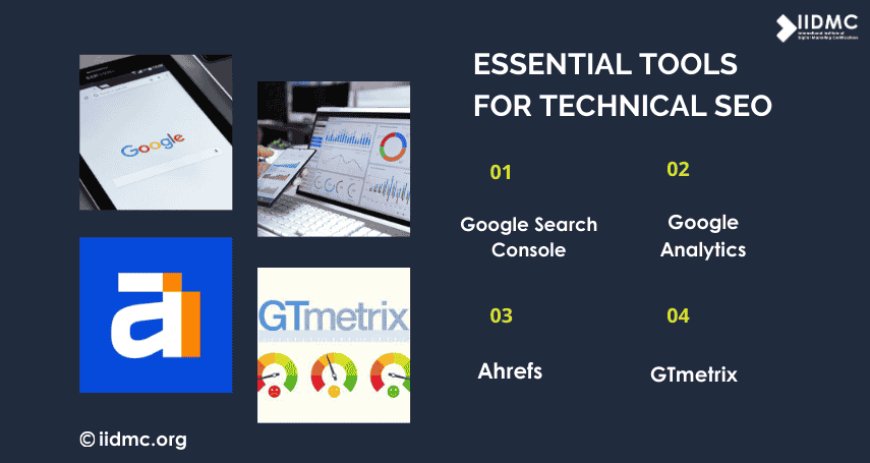Technical SEO: Best Practices for Website Optimization
Optimize your website’s speed, mobile-friendliness, crawlability, and structure with technical SEO best practices to improve search engine rankings and user experience.

In digital marketing, search engine optimization is essential for boosting a website's visibility and performance. While most people focus on content and keywords, technical SEO is just as crucial in making sure your site works smoothly and can be easily found by search engines like Google. From my experience, technical SEO ensures that your website is properly structured, easy to navigate, and fast-loading, which can significantly improve your search rankings. By focusing on areas like mobile optimization and site speed and ensuring search engines can crawl your site, you can create a better user experience and increase your chances of ranking higher
What is technical SEO?
Being an SEO expert, I can tell you that technical SEO plays a critical role in getting your website noticed by both search engines and users. Essentially, technical SEO involves optimizing the technical elements of your site to help search engines crawl, index, and rank it effectively. This includes improving site speed, ensuring mobile friendliness, managing URLs, and making sure your website’s structure is optimized for search engines.
Why is technical SEO important?
Technical SEO is critical because it addresses the factors that affect how search engines crawl and understand your site. If search engines have difficulty crawling your site, they may miss important pages, resulting in lower rankings or even complete de-indexing. Proper technical SEO ensures that your website provides an optimal user experience, which directly impacts both rankings and conversion rates.
The main reasons to prioritize technical SEO include:
-
Faster page loading times: Slowly loading websites frustrates users and can lead to higher bounce rates. A fast website is also a ranking factor for search engines.
-
Mobile-Friendliness: With the increasing use of mobile devices, search engines prioritize mobile-friendly websites. Google uses mobile-first indexing, meaning it ranks websites based on their mobile versions first.
-
Indexing and Crawlability: If search engines can't properly index or crawl your site, your pages won't appear in search results, no matter how good the content is.
-
Improved User Experience: A technically optimized website is easier to navigate, providing a better experience for visitors, which can lead to higher engagement and conversions.
Key Practices in Technical SEO
To ensure your website is fully optimized for search engines, here are some essential technical SEO practices you should implement:
-
Site Speed Optimization: Website speed is a crucial ranking factor. Google prefers websites that load quickly, as it leads to a better user experience. Use tools like Google PageSpeed Insights and GTmetrix to analyze and improve your website’s speed by compressing images, minifying CSS and JavaScript, and leveraging browser caching.
-
Mobile Optimization: Since Google uses mobile-first indexing, having a mobile-optimized website is no longer optional. Ensure that your website is responsive, meaning it adjusts well to different screen sizes, and test it with Google's Mobile-Friendly Test tool.
-
XML Sitemap: An XML sitemap is a file that helps search engines understand the structure of your website and find all of its pages. Make sure your sitemap is up-to-date and submit it to Google Search Console for proper indexing.
-
Structured Data Markup: Adding structured data (or schema markup) to your website helps search engines understand the context of your content and display rich snippets (like star ratings, prices, etc.) in search results. This can increase your visibility and click-through rates.
-
Fixing Crawl Errors: Use tools like Google Search Console to identify crawl errors and ensure that search engines can access and index your pages correctly. Fix broken links, 404 errors, and any issues that may block search engine bots from crawling your website.
-
Optimize URLs: URL structure is a key factor in technical SEO. Use clean, simple, and descriptive URLs that contain relevant keywords. Avoid using long strings of random characters or numbers.
-
SSL Encryption: SSL certificates (HTTPS) ensure a secure connection between your website and its visitors. Google has confirmed that HTTPS is a ranking signal, and websites without SSL encryption may be flagged as “not secure” in browsers.
-
Canonical Tags: When you have duplicate content on your site (such as the same product page accessible from multiple URLs), use canonical tags to indicate the preferred version of a page. This prevents duplicate content issues and helps consolidate ranking signals.
-
Improve Internal Linking Structure: A clear internal linking structure helps search engines crawl your site more effectively and ensures that visitors can easily navigate from one page to another. It also distributes page authority across your website.
Essential Tools for Technical SEO
To implement and monitor your technical SEO efforts, several tools can help you analyze, optimize, and track performance:
-
Google Search Console: A must-have tool for every website owner. It helps monitor and manage your site’s presence in search results. You can check crawl errors, submit sitemaps, and gain insights into how Googlebot interacts with your website.
-
Google Analytics: This tool provides detailed data about your website’s traffic, user behavior, and other important metrics, which helps you optimize your content and technical aspects.
-
Screaming Frog SEO Spider: This powerful website crawler helps you find issues related to broken links, duplicate content, page speed, and more. It’s a great tool for technical audits.
-
Ahrefs: Known for its backlink analysis, Ahrefs also provides an in-depth look at your website’s technical SEO aspects, such as crawlability and site speed.
-
GTmetrix: A tool to test your website’s load speed and performance, offering recommendations for improvements.

The Future of Technical SEO
As technology continues to evolve, so will the strategies and tools for technical SEO. Here are a few trends to watch:
-
Core Web Vitals: Google’s introduction of Core Web Vitals as a ranking factor signals a greater emphasis on user experience. These metrics measure loading performance, interactivity, and visual stability, making them critical for SEO in the future.
-
Voice Search Optimization: With the rise of voice assistants like Google Assistant, Siri, and Alexa, optimizing for voice search will become an increasingly important aspect of technical SEO. Websites will need to focus on conversational keywords and local SEO strategies.
-
AI and Machine Learning: AI-powered tools are already transforming SEO practices, from content generation to predictive search behavior. Expect more sophisticated automation in the future that can analyze large volumes of data and suggest optimizations.
-
Evolving Mobile-First Indexing: Mobile-first indexing will continue to play a significant role in technical SEO as mobile traffic outpaces desktop usage. Websites will need to prioritize mobile optimization and seamless user experiences across all devices.
Other Aspects of SEO
While technical SEO is vital, it’s just one component of a comprehensive SEO strategy. Here are some other aspects of SEO that work alongside technical optimization:
-
On-page SEO: This involves optimizing individual pages with relevant keywords, engaging content, meta descriptions, and headings.
-
Off-Page SEO: Building high-quality backlinks from authoritative sites to improve your website’s credibility and domain authority.
-
Content SEO: Creating high-quality, informative, and engaging content that aligns with search intent and provides value to your audience.
-
Local SEO: optimizing your website for location-based searches, which includes claiming and optimizing your Google My Business listing and local citations.
Technical SEO is a crucial aspect of optimizing your website for better performance and higher search engine rankings. By focusing on elements like site speed, mobile optimization, and ensuring proper indexing, you can help search engines understand and rank your site more effectively. As SEO trends continue to evolve, staying updated on practices like Core Web Vitals and mobile-first indexing will ensure your website remains competitive. Combining technical SEO with other strategies like content and backlink optimization will enhance your site’s visibility and provide a better user experience, ultimately driving more traffic and success.





























